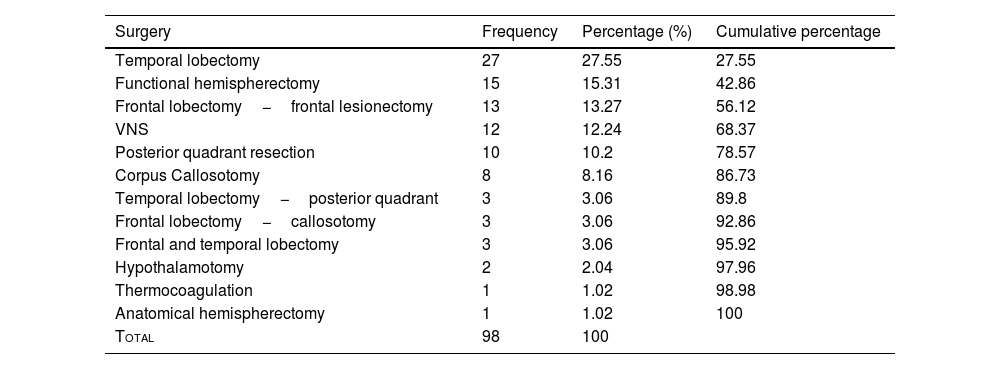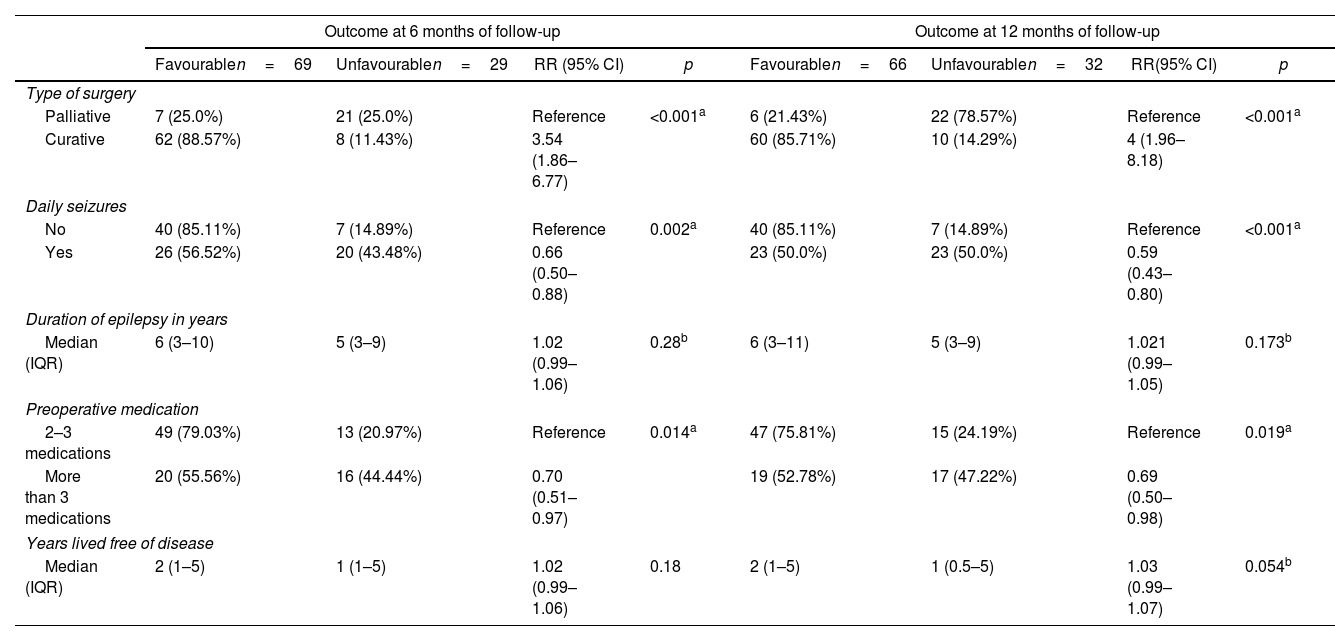Drug-resistant epilepsy is defined as the lack of response to two appropriately selected antiepileptic drugs that the patient has tolerated properly. Epilepsy is a common neurological disorder in the paediatric population, with an estimated prevalence ranging from 4.3 to 9.3 cases per 1000 children, affecting 1.2% of the global population. Despite pharmacological treatment, between 30% and 40% of patients fail to achieve adequate seizure control, and approximately half of these become candidates for epilepsy surgery.
ObjectiveTo determine the incidence of seizure freedom, considering the Engel classification, in paediatric patients undergoing epilepsy surgery at a level IV paediatric hospital in Bogotá, Colombia.
MethodologyA retrospective observational cohort study was conducted with paediatric patients treated at a level IV paediatric hospital by the epilepsy surgery team between January 1, 2013, and July 31, 2024.
ResultsBetween 2013 and 2024, a total of 326 patients were evaluated through the epilepsy surgery programme. Of these, 154 underwent surgery. The median postoperative follow-up was 40months. The type of surgery was significantly associated with a higher likelihood of achieving favourable outcomes at 6months (RR=3.54; 95%CI: 1.86–6.77; p<.001) and 12months of follow-up (RR=4; 95%CI: 1.96–8.08; p<.001). The presence of daily seizures and the need for treatment with more than three medications were associated with a lower likelihood of achieving favourable outcomes during the follow-up period.
ConclusionsThe loss of years of healthy life since the diagnosis of epilepsy and the type of surgery performed (palliative or curative) were identified as independent factors strongly associated with favourable outcomes in the treatment of drug-resistant epilepsy.
La epilepsia farmacorresistente se define como la falta de respuesta a 2 fármacos antiepilépticos seleccionados adecuadamente y que el paciente haya tolerado correctamente. La epilepsia es una enfermedad neurológica común en la población pediátrica, con una prevalencia estimada que varía entre 4,3 y 9,3 casos por cada 1.000 niños, afectando al 1,2% de la población mundial. A pesar del tratamiento farmacológico, entre el 30 y el 40% de los pacientes no logran un control adecuado de las crisis, y aproximadamente la mitad de estos se convierten en candidatos para cirugía de epilepsia.
ObjetivoDeterminar la incidencia de libertad de crisis, considerando la clasificación de Engel en los pacientes pediátricos sometidos a cirugía de epilepsia en un hospital pediátrico de IV nivel en la ciudad de Bogotá, Colombia.
MetodologíaSe realizó un estudio observacional retrospectivo de cohorte analítica, con pacientes menores de edad tratados en hospital pediátrico de IV nivel por el grupo de cirugía de epilepsia, entre el 1 de enero de 2013 y el 31 de julio de 2024.
ResultadosEntre 2013 y 2024 se evaluaron un total de 326 pacientes a través del programa de cirugía de epilepsia. De estos, 154 fueron sometidos a cirugía. La mediana del seguimiento postoperatorio fue de 40meses. El tipo de cirugía se asoció significativamente con una mayor probabilidad de obtener resultados favorables a los 6meses (RR=3,54; IC 95%: 1,86-6,77; p<0,001) y a los 12meses de seguimiento (RR=4; IC 95%: 1,96-8,08; p<0,001). La presencia de crisis diarias y la necesidad de tratamiento con más de 3 medicamentos se asociaron con una menor probabilidad de lograr resultados favorables durante el seguimiento.
ConclusionesLa pérdida de años de vida saludable desde el diagnóstico de la epilepsia y el tipo de cirugía realizada (paliativa o curativa) fueron identificados como factores independientes fuertemente asociados con resultados favorables en el tratamiento de la epilepsia farmacorresistente.
Article

If it is the first time you have accessed you can obtain your credentials by contacting Elsevier Spain in suscripciones@elsevier.com or by calling our Customer Service at902 88 87 40 if you are calling from Spain or at +34 932 418 800 (from 9 to 18h., GMT + 1) if you are calling outside of Spain.
If you already have your login data, please click here .
If you have forgotten your password you can you can recover it by clicking here and selecting the option ¿I have forgotten my password¿.














